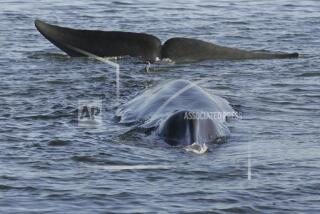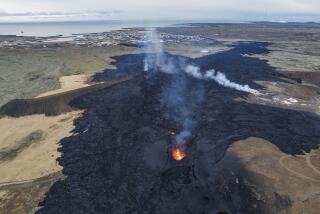Icelanders hunkering down
- Share via
REYKJAVIK, ICELAND — Here are a few things selling briskly in Iceland’s capital as Christmas approaches: horse meat, secondhand clothing and used DVDs of “The Sound of Music.”
Thrift is the new mantra in Iceland, a volcanic island nation just below the Arctic Circle, now trapped in economic deepfreeze with rising unemployment, soaring prices and a paralyzed banking system.
“Before, you didn’t think about what you were buying, but now we’ve been woken up,” said Holmfridur Kristinsdottir, who sells such delicacies as dried fish and pungent chunks of fermented shark at Reykjavik’s flea market. “When we buy beer now, we buy Icelandic beer -- it’s cheaper.”
This is a tough Christmas in Iceland, a country that cherishes its yuletide traditions.
Multicolored lights twinkle on houses and trees across Reykjavik during the 19 hours a day of December darkness. Soon children will place shoes on their windowsills for the 13 Yule Lads -- akin to Santa Claus -- who leave presents for the good and potatoes for the naughty.
But austerity is in the air now for Iceland’s 320,000 people, after a decade of boom that made their island a financial powerhouse with one of the world’s highest per-capita ownership levels of high-end Range Rover SUVs.
At his traditional food stand in the harbor flea market, Siggi Gardarsson says he is seeing a marked rise in sales of horse meat, a staple that’s about half the price of beef.
Maria Oskarsdottir is doing a brisk trade in her hand-knitted hats and mittens, and Olaf Olafsson says his military surplus clothing is having its best month ever.
“Some of the old hands say it happens in recessions: Sales go up,” Olafsson said. “We offer similar to the high-street stores, but half the price.”
A DVD stand in the market reports brisk sales of “The Sound of Music,” an uplifting family favorite, as Icelanders take refuge in simple pleasures.
Runar Birgisson says sales at his bookstall have doubled since the country’s main commercial banks collapsed in early October. “In Iceland, books are not a luxury item,” he said. “They are very important for your soul. For six months a year it is very dark and cold. It’s very comforting to read a good book.”
Iceland’s people are proud of how they have endured -- through plague, famine and volcanic eruptions that wiped out as much as half the population at a stroke -- over the millennium-plus since Vikings settled there.
Although Icelanders founded the world’s first parliament, the Althingi, in the 10th century, their country fell under Danish rule for centuries and only became fully independent in 1944.
Iceland used to be so dependent on a single industry -- cod fishing -- that from 1958 to 1976 it risked war three times with the British navy over fishing rights. In the 1980s, annual inflation ran as high as 85%.
History may have predisposed Icelanders to make the best of the good times while they lasted.
Financial deregulation and a 1990s stock market boom produced a decade of debt-fed economic expansion that saw Icelandic entrepreneurs snap up businesses around the world.
Many Icelanders joined in the lending-and-spending spree, taking easily available loans to buy houses, holidays and expensive cars.
Now Iceland’s currency, the krona, has collapsed; prices of imports have soared; many businesses are approaching bankruptcy; hundreds of people are laid off each week; and the government is seeking $10 billion in outside aid.
Icelanders are cutting back on spending and returning to tradition.
“People are sobering up,” said Thorbjorn Broddason, a sociologist at the University of Iceland. “In recent years money has been the king in Iceland. Successful people were those who were making lots of money. You walked around and wondered, ‘Why don’t I have a jet-black, shiny SUV? What’s wrong with me?’ I think this is going to change drastically. People are going to value loyalty and moderation.”
As the winter nights draw in, many Icelanders are drawing close to family.
“It’s important to keep your roots and keep together as families so no one is left alone,” civil servant Anna Johannsdottir said.
One recent evening, Johannsdottir gathered at home with her husband, three children and other relatives to make laufabraud -- Christmas cakes fried in hot fat. The recipe is a remnant of harsh times, when wheat was scarce.
“We are a rather new nation, a new democracy,” Johannsdottir said. “But tradition is one of the things that keeps the family together.”
More to Read
Sign up for Essential California
The most important California stories and recommendations in your inbox every morning.
You may occasionally receive promotional content from the Los Angeles Times.












